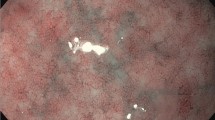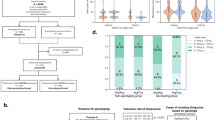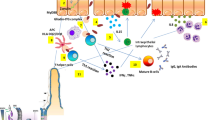Abstract
Background
Children with active inflammatory bowel disease (IBD) are frequently underweight. Anti-tumor necrosis factor (anti-TNF) agents may induce remission and restore growth. However, its use in other autoimmune diseases has been associated with excess weight gain. Our aim was to examine whether children with IBD could experience excess weight gain.
Methods
A centralized diagnostic index identified pediatric IBD patients evaluated at our institution who received anti-TNF therapy for at least 1 year between August 1998 and December 2013. Anthropometric data were collected at time of anti-TNF initiation and annually. Excess weight gain was defined as ΔBMI SDS (standard deviation score) where patients were (1) reclassified from “normal” to “overweight/obese,” (2) “overweight” to “obese,” or (2) a final BMI SDS >0 and ΔSDS >0.5.
Results
During the study period, 268 children received anti-TNF therapy. Of these, 69 had sufficient follow-up for a median of 29.3 months. Median age at first anti-TNF dose was 12.8 years. At baseline, mean weight SDS was −0.7 (SD 1.4), while mean BMI SDS was −0.6 (1.3). Using baseline BMI SDS, 11.6% were overweight/obese. At last follow-up (LFU), however, the mean ΔBMI SDS was 0.50 (p < 0.0001). However, 10 (17%) patients had excess weight gain at LFU; 3 patients were reclassified from “normal” to “obese,” and 7 had a final BMI SDS >0 and ΔSDS >0.5.
Conclusions
Pediatric patients with IBD may experience excess weight gain when treated with anti-TNF agents. Monitoring for this side effect is warranted.

Similar content being viewed by others
Abbreviations
- IBD:
-
Inflammatory bowel disease
- Anti-TNF:
-
Anti-tumor necrosis factor
- BMI:
-
Body mass index
- LFU:
-
Last follow-up
- SDS:
-
Standard deviation score
References
Gerasimidis K, McGrogan P, Edwards CA. The aetiology and impact of malnutrition in paediatric inflammatory bowel disease. J Hum Nutr Diet. 2011;24:313–326.
Vadan R, Gheorghe LS, Constantinescu A, et al. The prevalence of malnutrition and the evolution of nutritional status in patients with moderate to severe forms of Crohn’s disease treated with Infliximab. Clin Nutr. 2011;30:86–91.
Borrelli O, Bascietto C, Viola F, et al. Infliximab heals intestinal inflammatory lesions and restores growth in children with Crohn’s disease. Dig Liver Dis. 2004;36:342–347.
Hyams J, Crandall W, Kugathasan S, et al. Induction and maintenance infliximab therapy for the treatment of moderate-to-severe Crohn’s disease in children. Gastroenterology. 2007;132:863–873.
Issa M, Weber L, Shidham S, et al. Infliximab significantly increases proportion of overweight/obese Crohn’s disease patients receiving longterm maintenance therapy. Gastroenterology. 2006;130:A209.
Brown RA, Spina D, Butt S, et al. Long-term effects of anti-tumour necrosis factor therapy on weight in patients with rheumatoid arthritis. Clin Rheumatol. 2012;31:455–461.
Renzo LD, Saraceno R, Schipani C, et al. Prospective assessment of body weight and body composition changes in patients with psoriasis receiving anti-TNF-alpha treatment. Dermatol Ther. 2011;24:446–451.
Kuczmarski RJ, Ogden CL, Guo SS, et al. CDC growth charts for the United States: methods and development. Vital Health Stat. 2000;11:1–190.
Long MD, Crandall WV, Leibowitz IH, et al. Prevalence and epidemiology of overweight and obesity in children with inflammatory bowel disease. Inflamm Bowel Dis. 2011;17:2162–2168.
Briot K, Gossec L, Kolta S, et al. Prospective assessment of body weight, body composition, and bone density changes in patients with spondyloarthropathy receiving anti-tumor necrosis factor-alpha treatment. J Rheumatol. 2008;35:855–861.
Florin V, Cottencin AC, Delaporte E, et al. Body weight increment in patients treated with infliximab for plaque psoriasis. J Eur Acad Dermatol Venereol. 2013;27:e186–e190.
Shafferman A, Fontaine KR, Cron RQ, et al. Changes in body mass index in children with juvenile idiopathic arthritis treated with tumor necrosis factor inhibitors. J Rheumatol. 2014;41:113–118.
Gonzalez-Gay MA, Garcia-Unzueta MT, Berja A, et al. Anti-tumour necrosis factor alpha therapy modulates ghrelin in patients with severe rheumatoid arthritis. Ann Rheum Dis. 2008;67:1644–1646.
Kalra SP, Bagnasco M, Otukonyong EE, et al. Rhythmic, reciprocal ghrelin and leptin signaling: new insight in the development of obesity. Regul Pept. 2003;111:1–11.
Otero M, Nogueiras R, Lago F, et al. Chronic inflammation modulates ghrelin levels in humans and rats. Rheumatology. 2004;43:306–310.
Roubos EW, Dahmen M, Kozicz T, et al. Leptin and the hypothalamo-pituitary-adrenal stress axis. Gen Comp Endocrinol. 2012;177:28–36.
Aurangzeb B, Leach ST, Lemberg DA, et al. Assessment of nutritional status and serum leptin in children with inflammatory bowel disease. J Pediatr Gastroenterol Nutr. 2011;52:536–541.
Fawcett RL, Waechter AS, Williams LB, et al. Tumor necrosis factor-alpha inhibits leptin production in subcutaneous and omental adipocytes from morbidly obese humans. J Clin Endocrinol Metab. 2000;85:530–535.
Franchimont D, Roland S, Gustot T, et al. Impact of infliximab on serum leptin levels in patients with Crohn’s disease. J Clin Endocrinol Metab. 2005;90:3510–3516.
Karmiris K, Koutroubakis IE, Xidakis C, et al. The effect of infliximab on circulating levels of leptin, adiponectin and resistin in patients with inflammatory bowel disease. Eur J Gastroenterol Hepatol. 2007;19:789–794.
Versini M, Jeandel PY, Rosenthal E, et al. Obesity in autoimmune diseases: not a passive bystander. Autoimmun Rev. 2014;13:981–1000.
Singh S, Facciorusso A, Singh AG, et al. Obesity is associated with inferior response to anti-TNF therapy in immune-mediated inflammatory diseases: a systematic review and meta-analysis. Gastroenterology. 2017;152:S154.
Walters TD, Gilman AR, Griffiths AM. Linear growth improves during infliximab therapy in children with chronically active severe Crohn’s disease. Inflamm Bowel Dis. 2007;13:424–430.
Acknowledgments
The authors thank Kevin Chevalier for assisting in statistical analysis.
Author’s contribution
LH contributed to the acquisition and analysis of data, and writing of the manuscript. RC contributed to the design, data acquisition, and writing of the manuscript. BM contributed to the statistical analysis and interpretation of data. FE contributed to the design, analysis, and interpretation of data. SK contributed to the conception and design, interpretation of data, and writing of the manuscript. JT contributed to the conception and design, analysis and interpretation of data, and writing of the manuscript. All the authors have approved the final version for publication and agree to be accountable for this work.
Author information
Authors and Affiliations
Corresponding author
Ethics declarations
Conflict of interest
None.
Electronic supplementary material
Below is the link to the electronic supplementary material.
Rights and permissions
About this article
Cite this article
Haas, L., Chevalier, R., Major, B.T. et al. Biologic Agents Are Associated with Excessive Weight Gain in Children with Inflammatory Bowel Disease. Dig Dis Sci 62, 3110–3116 (2017). https://doi.org/10.1007/s10620-017-4745-1
Received:
Accepted:
Published:
Issue Date:
DOI: https://doi.org/10.1007/s10620-017-4745-1




